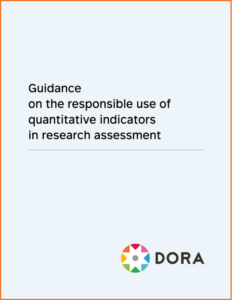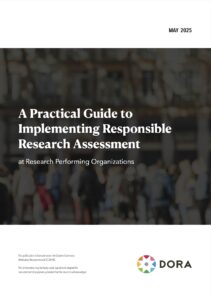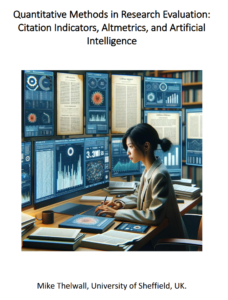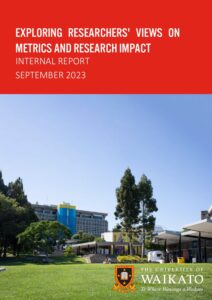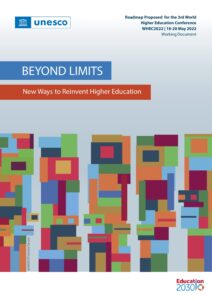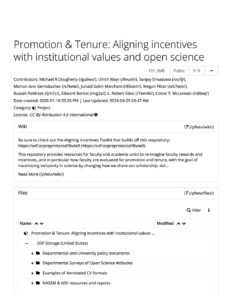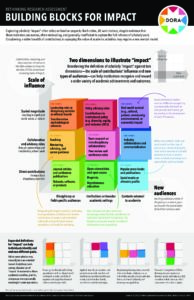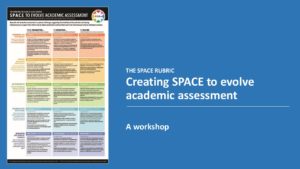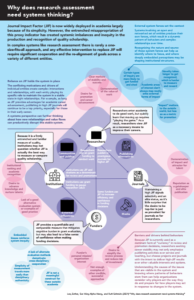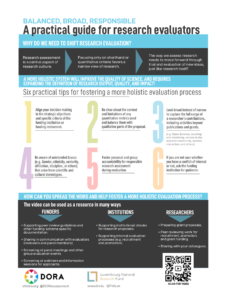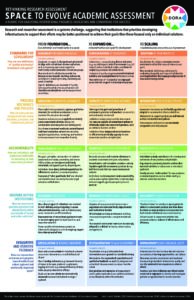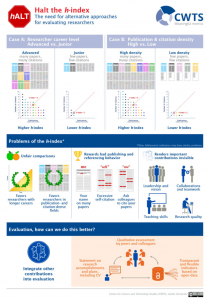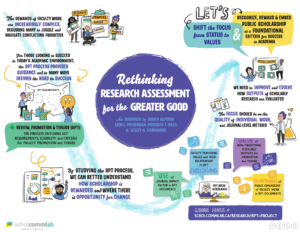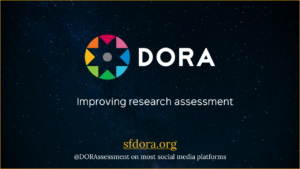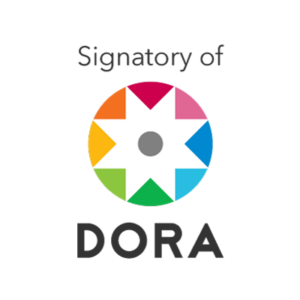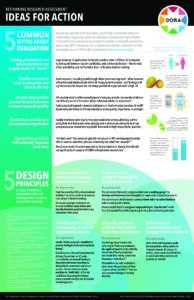A collection of materials to facilitate the development of responsible research and researcher assessment policies and practices.
Search and Filter
Resource type
Intended audience
Advocacy resourcesPolicies and guidancePosition papers
DORA-produced
For: FundersJournals and publishersProfessional societiesResearch institutesResearchers
2024
This document provides guidance on the use of several indicators (sometimes called metrics) used in research assessment: the Journal Impact Factor and other measurements of journals, citation counts, h-index, field-normalized citation indicators, and altmetrics. Five principles guide the use of these metrics: be clear, be transparent, be specific, be contextual, and be fair.
Advocacy resourcesPolicies and guidanceTools
DORA-produced
For: Research institutes
2025
"A Practical Guide to Implementing Responsible Research Assessment at Research Performing Organizations" provides action-oriented guidance, resources, and illustrative examples, for research performing organizations (RPOs) who are looking to shape and deliver responsible research assessment (RRA) practices. This includes RPOs who are looking to create an RRA strategy, organizations wanting to reform existing practices, and organizations simply wanting to take steps towards more holistic and inclusive approaches to research assessment.
Advocacy resourcesTools
For: FundersProfessional societiesResearch institutesResearchers
2025
These short educational videos in animated and talking head formats provide an introduction to the h-index, a commonly used scholarly metric for assessing authors’ publication output and citation impact. The videos explain how the h-index is calculated, how it is used to assess researchers, and its key limitations. They highlight important considerations, such as disciplinary…
Advocacy resourcesInitiativesTools
For: FundersJournals and publishersResearch institutes
This book critically analyses the value of citation data, altmetrics, and artificial intelligence to support the research evaluation of articles, scholars, departments, universities, countries, and funders. It introduces and discusses indicators that can support research evaluation and analyses their strengths and weaknesses as well as the generic strengths and weaknesses of the use of indicators…
Advocacy resources
For: FundersJournals and publishersProfessional societies
2023
This internal report for the University of Waikato investigates researchers’ perspectives on metrics and their influence on research impact, highlighting a multifaceted view of the role these metrics play in the academic landscape. While researchers generally acknowledged the usefulness of metrics, they were concerned about the over-reliance on these metrics, which can lead to a…
Advocacy resourcesGood practicesPolicies and guidance
For: FundersProfessional societiesResearch institutes
2022
This document from UNESCO is a roadmap for higher education, prepared for the “3rd World Higher Education Conference (WHEC2022).” Within the roadmap are “signposts for co-creating more open, inclusive, equitable and collaborative higher education systems that democratize access and knowledge.” Recognizing the evolution of and advancements in higher education, UNESCO has outlined 5 sections discussing…
Advocacy resourcesGood practicesInitiatives
For: Research institutes
2020
This repository contains resources for faculty and academic units that are working to transform how faculty are rewarded and evaluated for promotion and tenure, with the aim of promoting inclusivity via open science practices. This “Impact as Access” approach entails access to all aspects of research, including data sharing, direct involvement in research, and access…
Advocacy resourcesGood practicesInitiatives
For: Research institutes
2022
The More Than Our Rank scheme and SCOPE Framework for Research Evaluation, launched by the International Network of Research Management Societies Research Evaluation Group (INORMS REG), are initiatives that both have a focus on equity in academia and research. More Than Our Rank aims to address the limitations of global university rankings and encourage academic…
Advocacy resourcesGood practicesPosition papers
For: FundersJournals and publishersProfessional societiesResearch institutes
There is a growing recognition that current evaluation metrics often fail to capture the breadth and depth of research impact. In hopes of addressing the reform needed in the research world the Global Young Academy, the InterAcademy Partnership, and the International Science Council have collaborated in conducting a global assessment of research evaluation perspectives. Their…
Advocacy resourcesTools
DORA-produced
For: Research institutes
This is part of DORA’s toolkit of resources to support academic institutions that are improving their policies and practices. Find the other resources in the toolkit here. Building Blocks for Impact is a one-pager that outlines and illustrates the wide variety of academic achievements and outcomes that could be considered “impactful”. This model visualizes “impact” on…
Advocacy resourcesTools
DORA-produced
For: Research institutes
This is part of DORA’s toolkit of resources to support academic institutions that are improving their policies and practices. Find the other resources in the toolkit here. Debiasing Committee Composition and Deliberative Processes is a one-page brief that identifies strategies for including more perspectives and reducing biases in the evaluation processes for hiring, promotion, tenure, and…
Advocacy resourcesTools
DORA-produced
For: Research institutes
This is part of DORA’s toolkit of resources to support academic institutions that are improving their policies and practices. Find the other resources in the toolkit here. With thanks to volunteers in the DORA community, most resources in the workshop kit are also available in Spanish. See below. This kit is intended to equip organizers…
Advocacy resources
For: FundersJournals and publishersProfessional societiesResearch institutes
2021
Ruth Schmidt and colleagues explain how systems thinking can advance responsible research assessment. In an infographic format, they identify external forces that reinforce the use of the Journal Impact (JIF) as a surrogate measure for research quality in academic career advancement, despite its well documented deficiencies as a tool for research assessment. By demonstrating schematically…
Advocacy resourcesTools
DORA-produced
For: Funders
This is part of DORA’s toolkit of resources to support academic institutions that are improving their policies and practices. Find the other resources in the toolkit here. Balanced, broad, responsible: A practical guide for research evaluators is a short, informative video that is accompanied by a one-page brief. The video and document are meant…
Advocacy resourcesTools
DORA-produced
For: Research institutes
This is part of DORA’s toolkit of resources to support academic institutions that are improving their policies and practices. Find the other resources in the toolkit here. With thanks to volunteers in the DORA community, SPACE is also available in Catalan and Spanish. See below. Improving research and scholarship assessment practices requires the ability to…
Advocacy resources
For: FundersProfessional societiesResearch institutes
2021
The Centre for Science and Technology Studies (CWTS) studies bibliometric and scientometric tools to support research assessment reform and strategic decision making for developing science policy. In March 2021, the CWTS published an infographic on “problems with the H-index and reasons for integrating other contributions into evaluations”. This infographic gives different examples of how the…
Advocacy resourcesJournal articles
For: Research institutes
2020
The ScholCommLab in Canada conducted a multi-year project examining more than 850 review, promotion, and tenure (RPT) guidelines in the United States and Canada to better understand academic career advancement. The lab examined how the public dimensions of faculty work, use of the Journal Impact Factor, and non-traditional scholarly outputs were recognized and rewarded in…
Advocacy resources
DORA-produced
We know that slide presentations are one of the primary means of academic communication. To help you talk about research assessment, we created three presentations that are available for download.
Advocacy resources
DORA-produced
The badges for our signatories show support for DORA, raise awareness about research assessment, and serve as a conversation starter with individuals or organizations that have not heard about DORA yet.
Advocacy resourcesTools
DORA-produced
Unintended Cognitive and Systems Biases identifies seven personal biases that can influence hiring, promotion, and tenure decisions.
Advocacy resourcesTools
DORA-produced
Ideas for Action outlines five common myths about research evaluation to help universities better understand barriers to change and provides analogous examples to illustrate how these myths exist inside and outside of academia.

